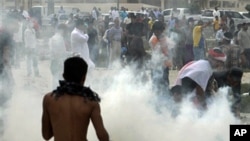A group of pro-government lawmakers in Bahrain has called on the country's ruler to impose martial law, after police fired tear gas at anti-government protesters who blocked a highway in the capital.
The state-run Bahrain News Agency said the lawmakers want King Hamad bin Issa al-Khalifa to enforce martial law for three months, and blamed "extremist movements" for an "unprecedented disruption of security."
The lawmakers also called for a curfew and the deployment of security forces across Bahrain in order to protect peace and stability. The government has not responded to the request.
Crown Prince Salman bin Hamad al-Khalifa said Sunday that "legitimate demands should not be carried out at the price of security and stability."
Police on Sunday confronted hundreds of anti-government protesters who blocked a highway into Manama's financial district, in one of the Gulf state's most violent confrontations since a deadly government crackdown on the opposition last month.
Police fired tear gas and water cannons at the demonstrators in what the government called an operation to re-open the King Faisal Highway. The government urged the protesters to remain at their encampment in Manama's Pearl Square, which police surrounded before pulling back. Journalists say protesters showed them rubber bullets apparently also fired by security forces.
The White House on Sunday condemned the Bahraini government for the violence, urging it to "use restraint and to respect the universal rights" of the protesters.
Thousands of mostly Shi'ite protesters have been occupying Pearl Square for weeks and staging rallies outside government buildings and royal palaces to demand a greater political voice for the island nation's Shi'ite majority.
Some of the demonstrators want Bahrain's minority Sunni rulers to give up their monopoly on power, while others want the ruling al Khalifa family to be ousted completely. Bahraini security forces killed seven protesters in street battles in the days after the demonstrations began in mid-February.
Bahrain's Sunni rulers have offered a dialogue with the opposition on political reforms. But many Shi'ites say they will continue protesting in the streets until the government accepts their demands.
Some information for this report was provided by AP, AFP and Reuters.




